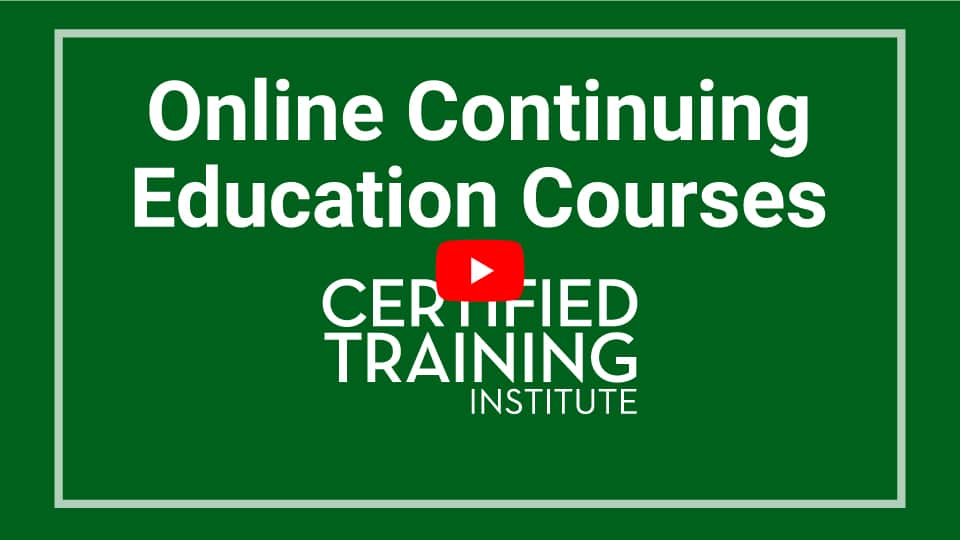Pesticide Applicator Continuing Education
Courses must be completed by 11:59pm EST 12/31, annually
Each course includes an official certificate of completion that you can save for your records. Looking for state reporting information? Learn more here.
Registered Employees must complete their continuing education by June 30 in odd-numbered years. The next recertification deadline is June 30, 2025. Credits must be completed by February 28, 2025.
Certified Operators must complete their continuing education every five years from date of initial certification. Hours must be completed 90 days prior to the certification expiration date.
CE Requirements: Every applicator must complete a specific number of continuing education hours. See chart for details
» View Georgia Structural Pesticide Applicator Continuing Education Requirements
Certified Operators
Household Pest Control - 25 hours - max 10 hours from computer based training
Wood Destroying Organisms - 25 hours - max 10 hours from computer based training
Fumigation - 12 hours - max 5 hours from computer based training
Registered Employees
Household Pest Control - 8 hours - max 4 hours from computer based training
Wood Destroying Organisms - 8 hours - max 4 hours from computer based training
Fumigation - 3 hours - max 1 hours from computer based training
Georgia Bat Damage Management
The site of a bat hanging around a structure can be unnerving to most clients. Finding one inside a home is even more unsettling and can send the homeowner into a panic. This course will talk about the identification of bat issues, fundamentals of bat control, and a few health issues that can be quite costly for wildlife control operators and clients.
Georgia Bed Bugs: Overview and Management
This course looks at the history of bed bugs, current integrated pest management approaches to preventing and managing an infestation, and several of the chemical options available when your non-chemical controls and methods have failed.
Georgia Common Pests of Residential, Industrial & Institutional Structures
This online video course teaches pest managers in Georgia how to identify and control interior and exterior pests that can damage property and infect people.
Georgia Federal Pesticide Laws
Pesticides are regulated to utilize their benefits while protecting public health and welfare and preventing harm to the environment. This course addresses the federal pesticide laws that control the labeling, sale and distribution, storage, transportation, use, and disposal in the best public interest.
Georgia General Structural Pest Management
Certified or licensed professionals have legal responsibilities to fulfill in every job. Not only do they have to control pests, but also they have to do the paperwork and legwork that documents applications. This course reviews the basics of general structural pest management.
Georgia Inspecting Structures for Wildlife
If you do not diagnose the problem correctly you will spend a lot of time treating something that is not there. Identify correctly and gather evidence and determine the extent of potential problems. This course will cover the basics of what to look for while inspecting a structure that has potentially been invaded by wildlife.
Georgia IPM for Termite Prevention
This course provides a review of IPM principles, termite biology, and several IPM practices to make any structure less attractive to termites.
Georgia Mice: The Ubiquitous Commensal Rodent
One of the challenges with house mice is that clients don't take house mice seriously. It's amazing how people will move heaven and earth when rats are around, but when it comes to mice they will simply say "oh, it's just a mouse!" This course will help educate applicators on the risks of allowing house mice to remain in a structure.
Georgia Personal Protective Equipment and Emergency Response
Wearing PPE can reduce exposure (dermal, inhalation, ocular, or oral) and thereby lower the chances of pesticide injury, illness, or poisoning. It is important that all pesticide applicators and handlers understand the protections and limitations of PPE.
Georgia Pest Control Practices in Residential, Industrial & Institutional Structures
This course teaches agricultural pest managers safe, effective, and economical pest control techniques. You'll be able to manage pests that cause property damage, infect or injure people, or affect the quality of life while minimizing risks to yourself, others, and the environment.
Georgia Pesticide Formulations
Pesticides are formulated to make them safer or easier to use. There are many formulations available for various pest control sites and situations and it is important that applicators choose the best one for the job.
Georgia Pesticide Hazards and First Aid
Pesticides are designed to be toxic so they can control pests (e.g., plants, insects, rodents, fungi, and bacteria) while not harming non-target organisms and anyone else exposed to the product. Pesticide users need to be concerned with the hazards associated with exposure to the chemical and not just the toxicity of the pesticide.
Georgia Pesticide Labeling
The pesticide label is the main method of communication between a pesticide manufacturer and pesticide users. By law, pesticide users are required to comply with all instructions and use directions found on the pesticide product label.
Georgia Pesticides in the Environment
Applicators and the public share concerns about how pesticides may harm the environment. Initially, hazards to humans were the primary reason the U.S. Environmental Protection Agency (EPA) decided to classify a pesticide as a restricted-use product.
Georgia Respiratory Protection
When the pesticide label requires a respirator it's important to know how to use a respirator safely. This course outlines the types of respirators available, proper fit, and inspection/maintenance requirements.
Georgia Termite Inspection and Treatment
Inspecting and treating for termites can be a difficult process. Being familiar with common types of construction is extremely helpful. This course is a tour of the Mississippi State University Extension termite training facility. The facility consists of 12 different stations, each representing an area of a building or home where termites could enter the structure.

